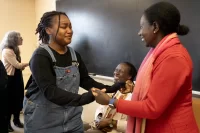Symposium examines stereotyping through children's literature
In an examination of how children’s literature transmits stereotypes, a series of talks, accompanied by three one-act plays, in a symposium titled What is Children’s Literature? will take place from 4 to 6 p.m. Friday, March 1, and from 9 a.m. to 4 p.m. Saturday, March 2. The public is invited to attend the sessions, which include breaks for discussion and meals, free of charge.
Symposium presenters, including scholars and Maine children’s author Amy MacDonald, will use children’s literature to investigate what social values and stereotypes children learn at a very early age.
“In this symposium, we would like to evaluate these stories and offer a new approach to prepare the next generation to meet the ‘other,’ ” said Mishael Caspi, visiting professor of philosophy and religion, referring to the credo of Emmanuel Levinas, a 20th-century French philosopher and religious thinker, who emphasized personal ethical responsibility to others.
Primary events for the symposium will be held (unless otherwise noted) in Room 104 of the Olin Arts Center. The events scheduled are as follows:
Friday, March 1
4:30 p.m. Keynote Lecture: What is Children’s Literature: Exploring the Boundaries, by Marcia Nash, professor of early childhood, University of Maine at Farmington.
Saturday, March 2
First Session:
9 a.m. Putting the Literature Back in Children’s Literature, by Falmouth children’s book author Amy MacDonald, who has written Rachel Fister’s Blister (1990), Little Beaver and the Echo (1997), No More Nice (1996), No More Nasty (2001) and the forthcoming Quentin Fenon Herter (2002).
Second Session:
10:30 a.m. Picture Books as Poetry, by Anne Dodd, professor of education at Bates and author of two children’s picture books about beachcombing, The Story of Sea Glass (1999) and Footprints and Shadows (1992).
11:15 a.m. Children’s Imagination: Imagining Children, by Frank Carner, professor of English at the University of Southern Maine.
Third Session:
1 p.m. Picturing Diversity in Maine and the World, by Denise Pendleton, co-director of Born to Read, a program of the Maine Humanities Council.
1:45 p.m. The Other — A Resource or Threat? A Model Based on Two Children’s Stories: ‘The Ugly Duckling,’ Hans Christian Andersen, and ‘Raspberry Juice,’ H. Senhave, by Liora Israeli, lecturer at Gordon College in Haifa, Israel.
Fourth Session, to be held at Central Maine Technical College:
2:30 p.m. A production of three one-act plays from the book The Answered Prayers, performed by The Lakeside Players at CMTC, under the direction of Bonnie and Bud Santos.
4:30 p.m. Panel discussion, moderated by Marcus Bruce, professor of religion and African American studies at Bates.
Sponsored by the Department of Religion and Philosophy, What is Children’s Literature is funded by grants from the Maine Humanities Council, the offices of the president, dean of faculty and dean of the college, and the divisions of humanities and interdisciplinary studies.




